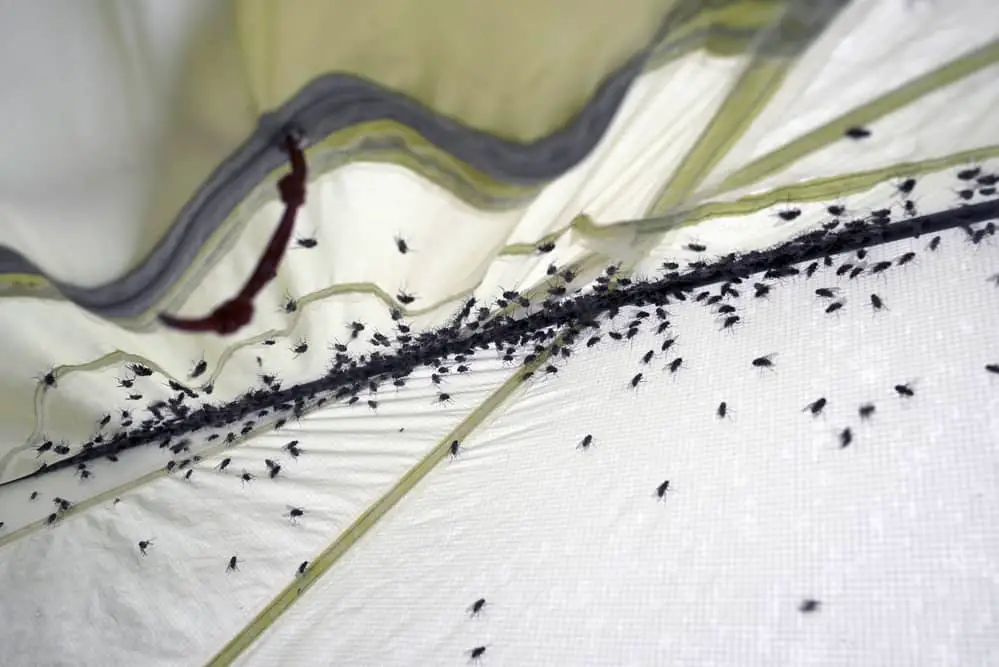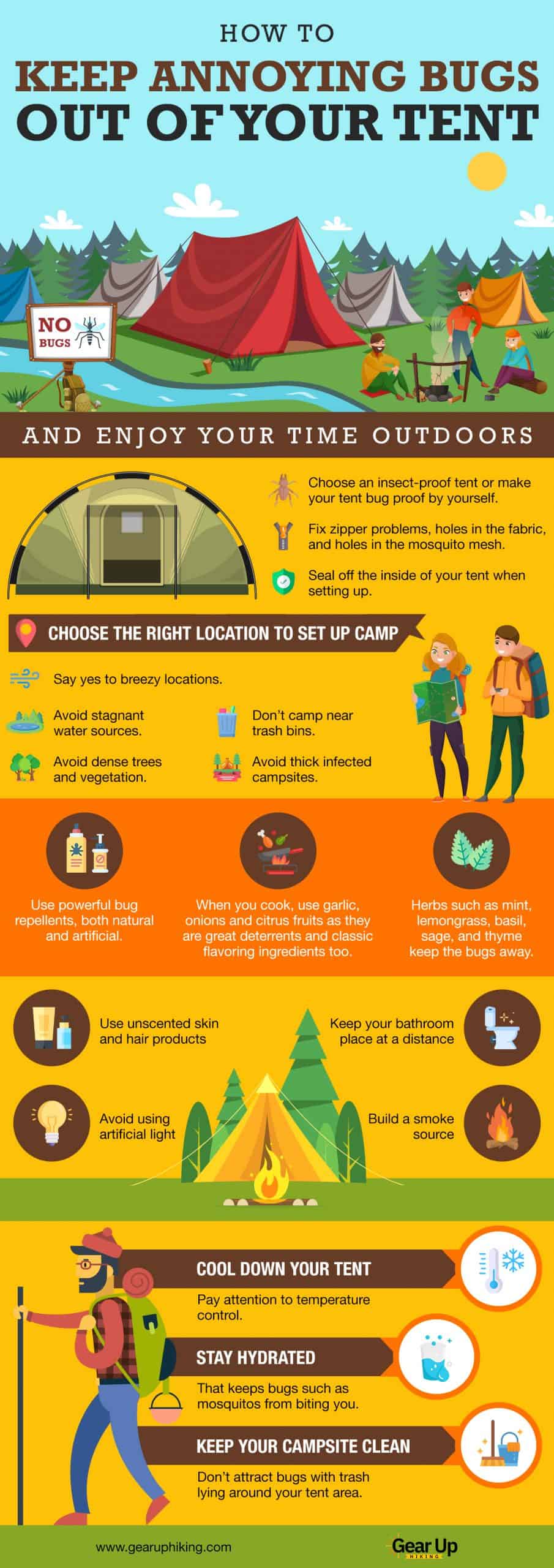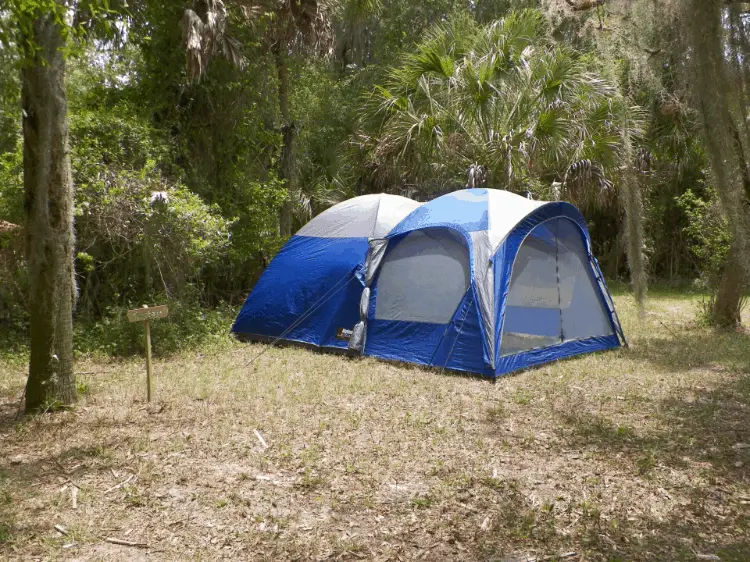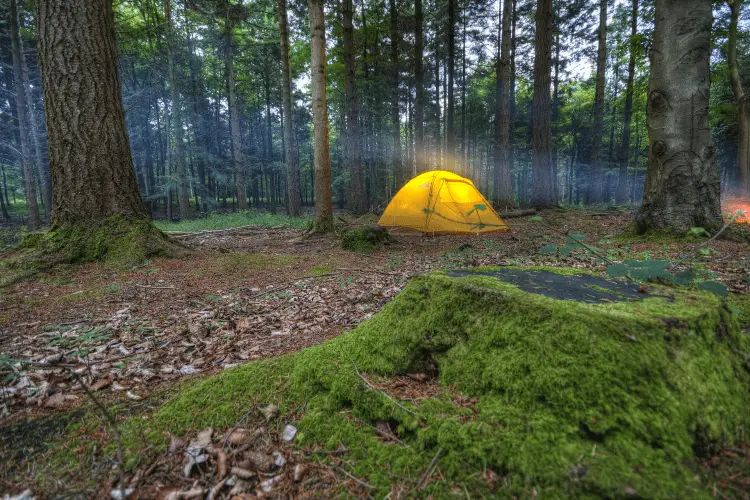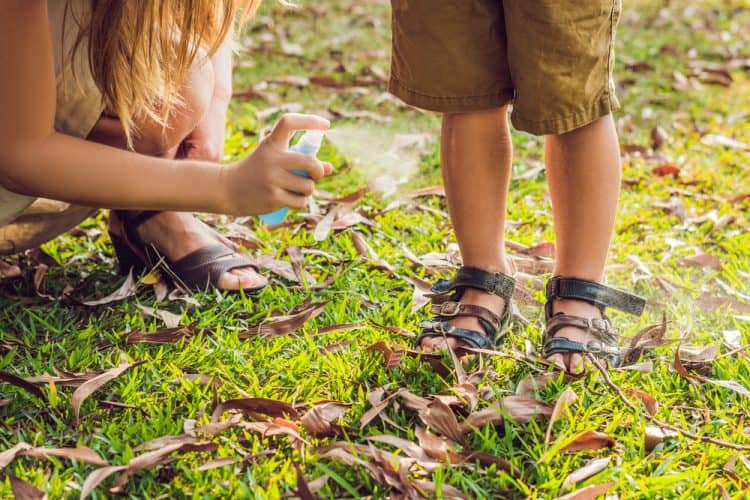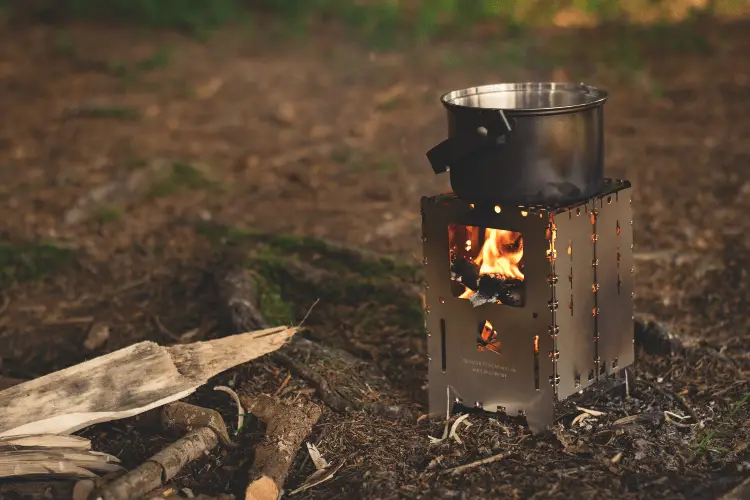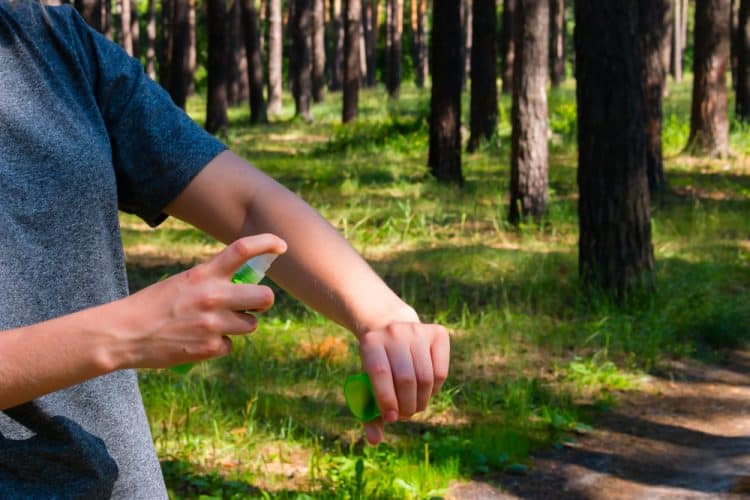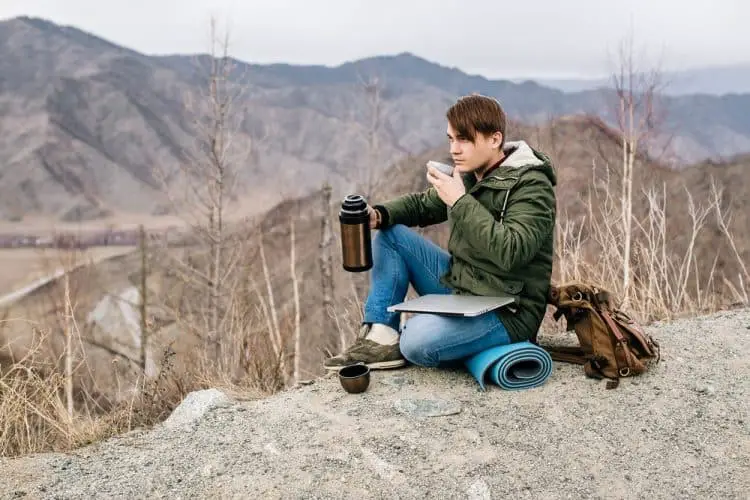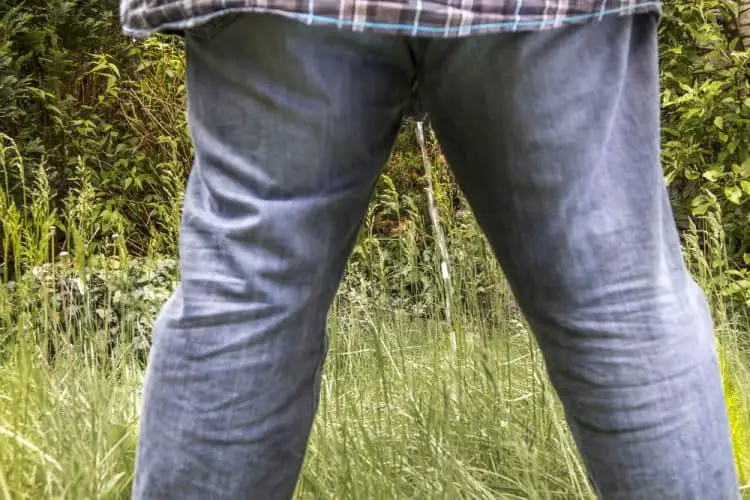How To Keep Bugs Out Of Your Tent (An EPIC Guide)
There’s a common reason why some people avoid camping at all costs.
They hate bugs.
Unfortunately, bugs and insects are part of the glorious package that is nature.
They buzz from the trees, crawl through earth and sometimes, they even make their way into your tent.
But what if you learnt how to keep bugs out of your tent? There are plenty of methods to effectively keep bugs out of your tent – with the right choice of tent, location and insect repellent gear. Not only does proper camp setup reduce the chance of unwanted bed guests, you can also apply natural repellents to further keep them out.
If you’re worried about mosquitoes keeping you up all night or being bitten by disease-carrying ticks, we have some solutions for you.
But before you can sufficiently prepare for your bug-free camping experience, you first need to know what kind of annoying insects will bug campers. And no, huddling up in your sleeping bag doesn’t help. In fact, we proved that you don’t need a sleeping bag for camping.
In this easy guide we will provide helpful insider tips on how to keep those nasty insects outside of your tent.
Let’s dive right in!
Common Insects You Can Encounter Camping
For most part, you’ll be pitching your tent on three main surfaces – grass, trodden earth and sand.
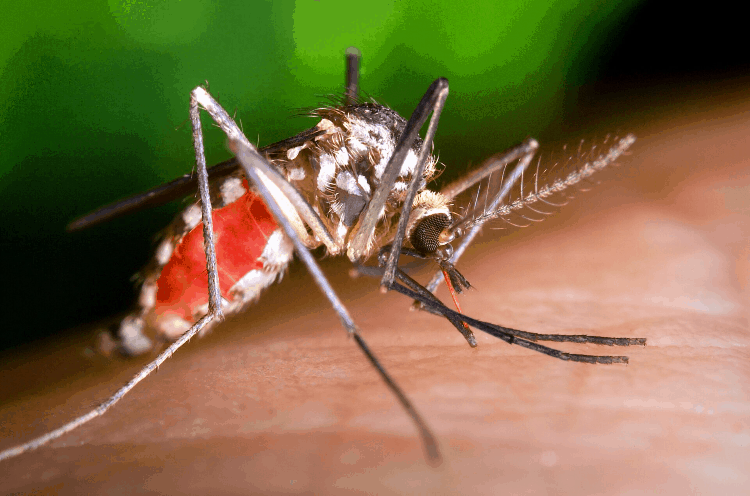
Mosquitoes are the most common and the most fearsome insects that we campers encounter.
The insects you’ll encounter are nothing unusual, unless you go out of the way into deep forests and untouched jungle grounds.
Campers on an overnight hiking trip learn that the common insects that can enter your tent include:
- Mosquitoes
- Ants
- Ticks
- Flies
- Spiders
- Fleas
- Bees, wasps, and hornets
The type of bugs you encounter will depend on season and location. Mosquitoes and bees are more active in warmer months, while the rest aren’t affected by temperature. Spiders are common near trees and ants exist everywhere.
How To Keep Bugs Out Of Your Tent: A Visual Guide
Now let's get to the point. Here's a good looking infographic that I designed. It summarizes the most important steps that will guarantee you a bug-free camping experience.
With a little luck, of course.
Share This Image On Your Site
Let's start with a very important step.
How to Bug-proof Your Tent?
There are things you can do before and during camping to keep bugs away from your tent. The key is to keep bugs outside before they can make their way inside.
Makes sense, right?
Let’s see.
Choose an insect-proof tent
You won’t be keeping insects away unless you choose the right tent. While you’re musing over whether to get a 4-season tent or not, make sure the tent door and windows come with zippers.
Openings should have a mesh to keep bigger insects out. Most tents suitable for stargazing do.
For extra protection or if you don’t want to keep your tent zipped closed at all times, you can set up a screen room. These large canopies and tents function to keep bugs away while netted walls allow maximum airflow. Most tents for humid weather have mesh walls.
You can also set up mosquito netting around your camping area; some are even treated with insect repellent!
Some brands such as Equinox, Sea To Summit, and UST offer the so-called bug shelters. They are ultralight and quite effective. Also, it's easier to hike with such a tent.
Inspect your tent and make it insect-proof
Before going camping, search your tent for any holes and tears. Branches and rocks easily make rips in the fabric, as does some of your camping equipment. Check the corners and zipper areas especially.
What I like to do is set up my tent at home and inspect it opened up. Some potential issues and solutions are:
- Zipper problems - Clean the entire zipper strip and tab with soap and water. Then lubricate the zipper with beeswax balm or candle wax. Oil tends to make a mess.
- Holes in the fabric - clean area around rip with alcohol. Take some repair tape and cut a piece at least one inch larger than the hole on all sides. Patch the hole from inside and outside for longer wear, especially if it’s in a high-tension area.
- Holes in the mosquito mesh - You’ll need a mesh patch for holes in the tent door or window. Make sure the torn section is completely flat and place the mesh patch over the hole. Using a ring repair tape, press it in place. Let it cure for a day.
Seal off the inside of your tent when setting up
To avoid bugs from getting into your tent, be smart when you set up your tent.
- Set up your tent with the zips closed. In fact, always keep the door zipped if possible.
- Throw all your items inside quickly. You can fix them up later.
- Leave your food outside the tent because it draws in bugs.
- Brush off any insects hanging on the tent door before entering.
- Enter and exit the tent as little as possible. Close the door quick.
- Be careful with flashlights and use as little light inside of your tent as possible. Insects are attracted to artificial light.
Choosing the Right Location
You’ve arrived at your campsite and are preparing to set up the tent. Before you do so, make sure you’re at the right location!
The types of insects you get depend on what is around your tent. Here's how to choose your camp location in 5 easy steps.
Say yes to breezy locations
A pro of investing in an all-season tent is that it can withstand windier weather. Wind can carry bugs away from your campsite, making it harder for them to hover and land. Make sure your tent door faces away from the wind! You don’t want bugs driven inside your tent.
Avoid stagnant water resources
Stagnant water such as lakes, ponds, marshes, drains, ditches and even the smallest puddle can be breeding ground for mosquitoes. You also want to avoid hollowed out trees and upturned buckets.
Avoid dense trees and vegetation
It goes without saying that trees are great homes for bugs. They may also host bee, wasp and hornet nests. Dense forest block winds that help sweep bugs away too. Vegetation is equally unwelcome. It collects moisture which breeds insects and attracts wild animals. In summer, many people prefer camping under the trees to keep their tents as blacked out as possible. Do mind the insects, though.
Don’t camp near trash bins
Even if you can stand the smell, you won’t want the flies! They’re also infested with ticks and fleas that carry diseases – no thanks.
Avoid tick infested campsites
Some camping grounds come with warning signs. If rangers put up warnings about tick presence, avoid camping in those areas. You don’t want to risk carrying them back home either.
Essential Bug Repellents
The first thing that pops into mind when we think about keeping bugs away is no doubt insect repellents.
There are plenty of efficient natural and artificial repellents. Let’s start with the natural ones.
Natural Insect Repellents
While many hop onto the traditional insect repellent bandwagon due to high effectiveness, natural bug repellents are considered a healthier alternative.
Herbs
You can use fresh and dried herbs to repel bugs. Since the smell is what keeps the bugs away, you have the options of:
- Burning them in a campfire
- Rubbing them over skin
- Hanging cuttings over tent openings
- Keeping herbs inside your tent around all corners
And here are some herbs known to repel bugs:
- Basil
- Lavender
- Lemongrass
- Lemon thyme
- Rosemary
- Mint
- Sage
- Catnip
- Oregano
- Parsley
- Thyme
Did you know that the food you cook and eat also might repel bugs?
I kid you not. Continue reading.
Foods
It’s only natural to bring food along on your camping trip, so work with that!
Garlic, onions and citrus fruits are great deterrents and classic flavoring ingredients too.
- Cook with them so smell can permeate air
- Ingest a lot so the smell seeps out of your pores (will make mosquitoes less likely to land on skin)
- Rub them on skin or clothes (although the smell may become overwhelming)
Essential oils
You can make your own insect repellent via mixing essential oils. These are much healthier and nicer to inhale than traditional chemical sprays.
Take one tablespoon of rubbing alcohol or vodka, half a cup of water, half a cup of natural witch hazel and 10-30 drops of essential oils of your choosing:
- Citronella
- Juniper
- Lemongrass
- Eucalyptus
- Mint
- Tea tree
- Peppermint
- Sage
- Clove
- Thyme
For a stronger mixture, substitute water with apple cider vinegar or white vinegar. If you have sensitive skin, spray on clothes instead of skin.
Not a fan of covering yourself up with oils?
Keep jars of vinegar or your essential oil mixture around the tent or spray it directly onto tent fabric.
Artificial And Chemical Insect Repellents
Traditional insect repellents include sprays, lotions, diffusers and coils. There are also kid-friendly options like bug-repelling bracelets.
DEET sprays
Created for military use in the 1940s and later commercialized, deet is a chemical that effectively deters insects from landing on skin or clothing. Generally, you’ll find deet used in sprays.
While there have been concerns raised about the safety of this chemical, we simply advise that you follow product instructions and safety warnings.
Don’t spray near eyes or mouth. If you experience discomfort or rashes, consult medical services. Avoid using it on newborns if you camp or hike with your baby.
Bug-repelling diffusers and coils
Offering 84 – 100% protection against mosquitoes, these diffusers emit a pesticide (metofluthrin) that lasts up to 12 hours.
Similarly, pyrethrum-infused coils repel pests with both scent and smoke. Scatter these around your campsite for maximum efficiency. Some campers keep insects away by burning citronella candles around the campsite. I suggest placing one near your tent door as well as the food storage area.
Useful Bug Repellent Gear
I highly recommend doubling up the protection against bugs with some repellent devices or control gear. Mosquitoes in particular are pests you don’t want inside your tent!
Whether you’re shielding your tent or patio at home, machines like Thermacell Radius Zone Mosquito Repeller and the Armored Portable Mosquito Repeller cover a large space for hours without having to refuel.
Also known as “spatial repellents”, they act like diffuser units to emit repellent into the air. You simply have to insert repellent cartridges and set a timer. Keep wind sources away from the machine as it will decrease the effectiveness.
Another option is to draw flying pests towards a singular source. Zapplight combines an LED lightbulb with bug zapper to keep your campsite bug free.
You can also download apps that repel bugs via sound, such as Anti Mosquito Repellent Sound, but it’s difficult to vouch for effectiveness.
If you have sensitive skin or nose, bug-repelling bracelets are a great alternative! Wear on wrists or fasten to your tent flaps. It’s safe for kids and ensures they’re covered at all times.
8 Advanced Tactics To Keep Bugs Away
There are different ways to keep camping enjoyable without worrying about bugs every single minute.
We’ve mentioned that one way to keep pests out is by applying bug repellent alongside choosing a smart campsite location.
But is there a natural method to keep them away by simply taking informed action?
Let’s look at ways that keep bugs away and factors that attract bugs.
#1 Hydration is important
As every hiker knows, hydration is crucial when you’re outdoors. This applies to camping too. More importantly, staying hydrated actually keeps bugs like mosquitos from biting us!
Certain chemicals in our sweat, on our skin and in the carbon dioxide we exhale attract bugs. We have to regulate our temperatures to produce as little of these chemicals as possible.
#2 Certain foods repel bugs
Did you know that the food we eat affects the smells we give out? Beer, for instance, really attracts bugs! Keep that in mind when you bring beer when hiking or camping.
Certain types of food are especially pungent to bugs, including garlic and onion. One way to quickly reduce your attraction factor is to consume garlic capsules.
#3 Use unscented skin and hair products
Like the chemicals our bodies excrete, scents from the hygiene products we use can also attract insects.
To stay clean but keep our scents minimal, use unscented products instead. Alternatively, you can use products with natural ingredients that repel insects - lemongrass, lavender, mint, eucalyptus infused deodorant, for example.
Avoid using floral scents, as these draw mosquitos. On the other hand, they avoid sharp smells.
#4 Keep your bathroom place at a distance
The high concentration of ammonia in urine and remnant traces of food in human poop is a love call to bugs like flies.
Leave some distance between your tent and bathroom space to reduce possibility of interaction.
#5 Keep your campsite clean
Don’t attract bugs with trash lying around your tent area. Garbage and trash also invite wild animals. Follow these rules. I certainly do!
- Keep cooking and dining area clean – lay down plastic sheets to catch food debris if possible.
- Don’t leave containers open, especially if there’s still food inside.
- Clean your dishes and utensils immediately after use.
- Don’t bring kitchenware into the tent – there could be residue smells.
- Don’t leave trash bags open. Tie them well and dispose immediately. Some campsites are designed to provide a trash station.
- If you have to store leftovers, put them in a large plastic container with secured lids.
- Wipe down any surfaces you’ve used.
#6 Avoid using artificial light
Insects love artificial light, which is why you should pitch your tent away from lampposts and the like.
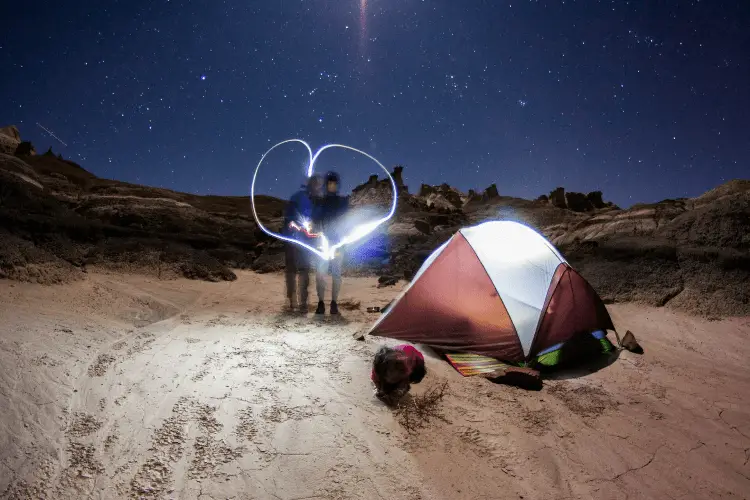
That’s so romantic. But the light attracts insects!
It is best not to tie lights around the openings of tents either, as it is a sure way of attracting flying ants and moths.
If you’re planning on spending time outside of your tent, make a campfire instead. While campfires might be dangerous left overnight unsupervised, they provide ample light and will ward off insects. Plus, they are a great way of heating your tent without using electricity.
#7 Build a smoke source
Why build a campfire, you may ask?
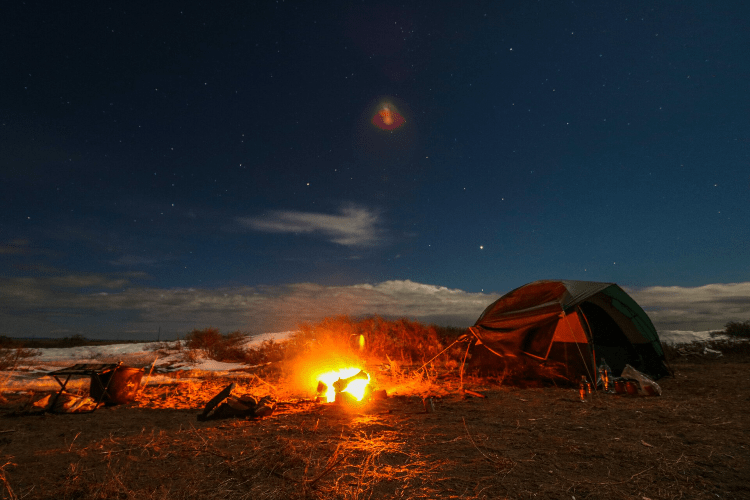
That’s also romantic. And it repels bugs!
Insects hate smoke!
Traditionally, people use torches, candles and campfires to keep unwanted bugs away. That’s also the reason why insect repellent coils work so well. Tabaco smoke is especially effective against spiders.
Plus, a campfire will often allow you to dry your wet tent easily from the morning dew.
#8 Temperature control
Have you ever wondered why insects tend to disappear in the winter?
While all insects have some ability to survive cold temperatures, their natural instinct is to burrow into the earth and hibernate to conserve body energy. This means you’ll see fewer active insects in fall and winter months.
Many insects die when temperatures drop below 0⁰F, although the exact temperature differs from bug to bug. Some insects, like mature fleas, can’t survive below 37⁰F. Other, more invasive species may require -30⁰F to be wiped out.
So how do you cool down the air in your tent?
It’s easier than you think to cool down the air in your tent to repel bugs. It might not put you 100% in the clear, but you’ll definitely experience a much quieter night.
- Buy a tent with mesh windows for extra ventilation. Keep these vents open for air circulation.
- Set up your tent under shade.
- Set your tent within a pit in the ground if possible – lower layer soil is cooler than on the surface.
- Go camping in cooler months or pitch just before the sun goes down.
- Use reflective tarps or sheets to keep the sun rays off.
- Bring a portable fan that is lightweight enough to attach to the walls.
- Hang wet towels (cool from rivers or streams) in front of the fan.
In Conclusion
There isn’t just one way to keep your camping experience enjoyable and free!
We’ve given you many different tips, from choosing the best tents to campsite location. Supplement with generous applications of natural bug repellents and you’re sure to sleep well without bugs disturbing you.
My biggest piece of advice is to do some research before camping. Where are you going? What bugs are native to that place? Are there specific campsites that have trash receptacles? Knowing the lay of the land makes a huge difference in preparing for it.
With proper preparation, your camping trip will be wonderfully bug free.
Asen Stoyanchev
Founder of this website, Asen is a passionate hiker and writer who is also a gear nerd. He’s been featured on many established hiking websites where he gives hiking advice & tips. When he is not trekking with his family or friends, he is writing articles and product reviews. Asen spends most of his time in Bulgaria but he constantly travels the world in seek of more unforgettable experiences. Read more about Asen here.

